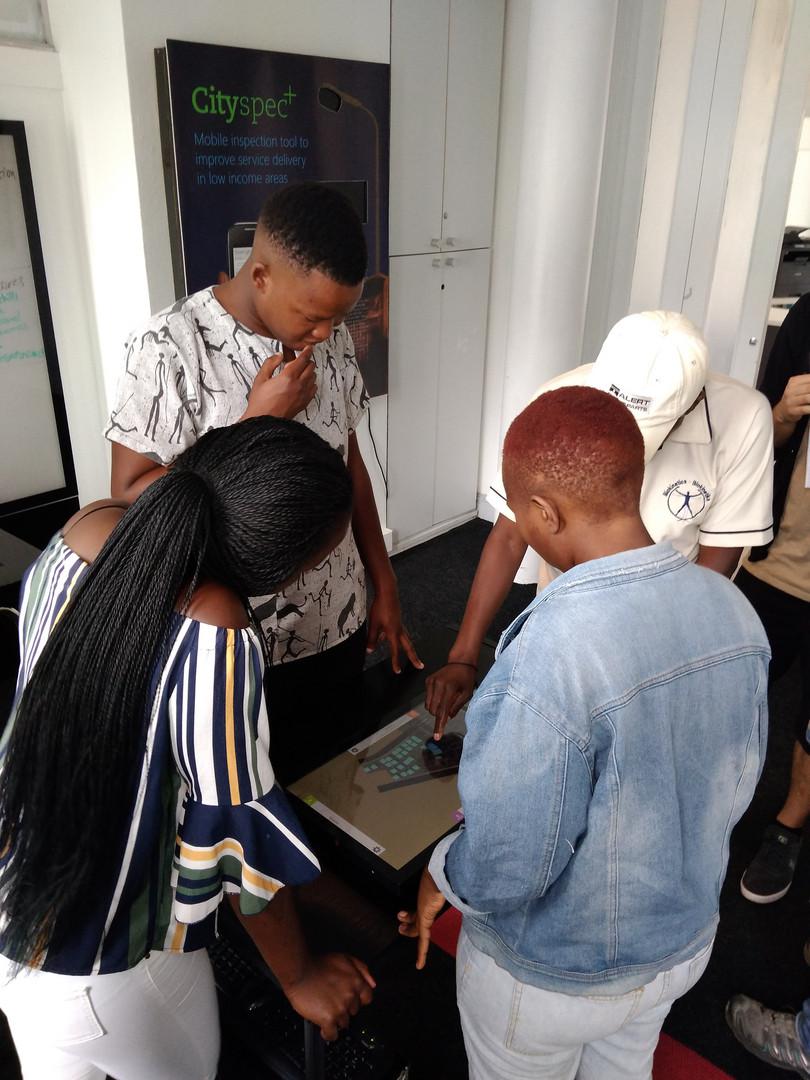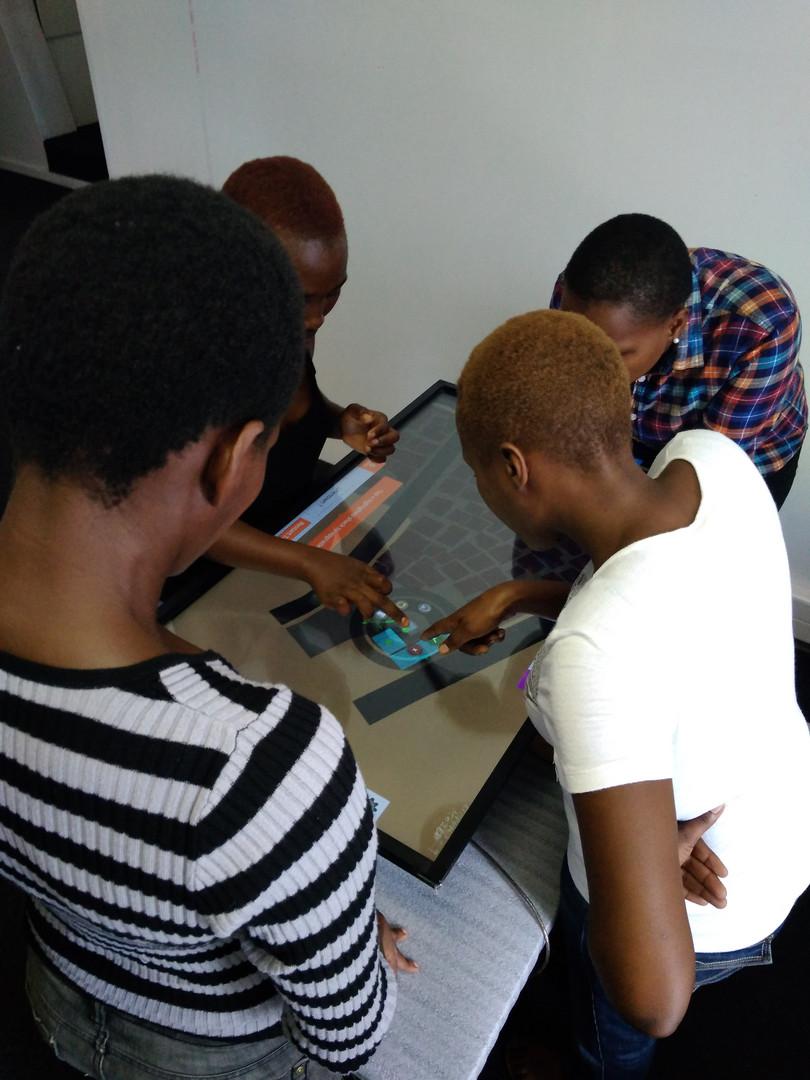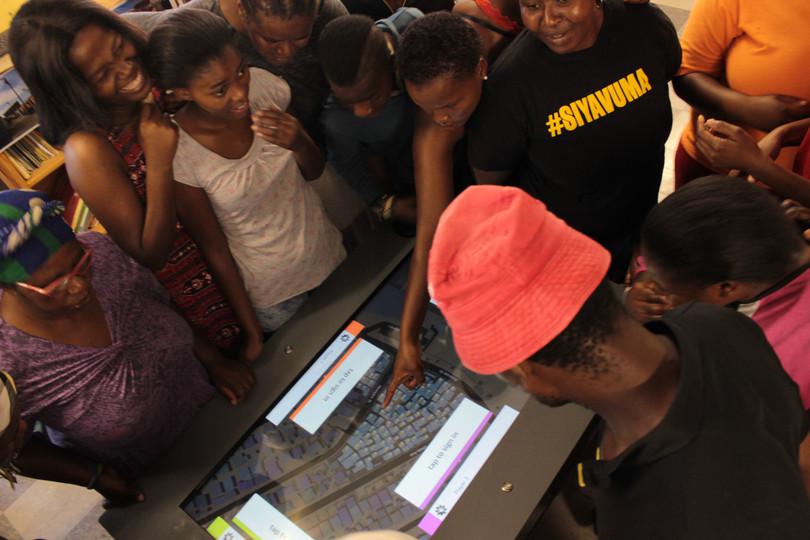About ReBlok and Vukuzenzele
ReBlok is a for-profit social enterprise that creates innovative community planning and engagement solutions in the context of in-situ informal-settlement upgrading, a top priority in addressing South Africa’s housing challenges.
Vukuzenzele is our flagship product, and is a customisable platform based on a computer-aided design (CAD) base-layer to support collaborative game-based participatory planning of in-situ informal-settlement upgrading. In short, we have gamified participatory planning, and the empirical evidence has illustrated the following benefits compared to conventional top-down master-planning:
- educational, deep and meaningful participation rather than a ‘tick-box’ exercise
- collective ownership of the final design rather than disillusionment and disenfranchisement
- collaboration in implementation rather than contestation and conflict.
Getting started with ReBlok
ReBlok seeks to become involved in the early and conceptual stages of the project phasing. Project funders could include national, provincial and local governments, parastatals, land owners, and even non-governmental organisations, and are required to make specific allocations in the terms of reference for the requirements of participation during pre-planning phases.
For example, a terms of reference (ToR) for a UISP project prepared by a local government could specify the basic requirements of participation as required by the official Upgrading of Informal Settlements Programme (UISP). The UISP allocates 3% of the entire project budget to this workstream. We explain this process in more detail in Part A of this user manual.
As such, ReBlok can add value to a wide variety of built-environment professionals tendering for such work, including project managers, engineers, planners, architects and surveyors. We also offer the following services:
- site identification criteria and engagements with local government
- aerial surveillance with drone and photogrammetry software
- creation of a settlement CAD model and the rental of game hardware
- community data gathering through household-level enumeration and data collection
- training and development of skilled community facilitation to ensure that public participation processes are deep and meaningful.
ReBlok founders
ReBlok is a for-profit social enterprise that creates innovative community planning and engagement solutions. The company is jointly run iKhayalami and Renderheads.
iKhayalami
iKhayalami is an NGO focused on community upliftment through urban planning and reblocking projects. Their key focus areas include disaster response, material procurement for reblocking, skilled facilitation and data collection, and infrastructure projects. Empower Shack, a collaboration with Switzerland-based Urban Think Tank, was nominated for the Royal Institute of British Architects (RIBA) International Prize.
Renderheads
Renderheads is a South African and British software-development company specialising in interactive media for clients including museum exhibitions, brand activations and services industries. It specialises in both service work (with a strong technical focus) and product development.
The problem
Informal-settlement upgrading projects are inherently complex because these take place in situ; where people already are. It is not the same as delivering houses on open serviced land. The process of installing critical infrastructure is disruptive to people’s livelihoods, existing investment in their dwellings, the informal footpaths they travel, and general fears of displacement, political interference, and land-invasion opportunism. Upgrading also represents risks for service providers to the government in terms of security of personnel, equipment, and time-bound deliverables.
For upgrading projects to be successful, the relational connections to place should be recognised, and effort should be made to study, in an immersive way, the social dynamics associated with the place. This is why participation during the first consultation and planning sessions are so important. Many projects have stalled because participation was not prioritised, and such failed projects have run into losses tallying millions of rands due to ceased works.
A solution: gamification of community participation
Gamification is the process of deploying game-design elements and game principles in non-game contexts, and has been successfully used to improve user engagement. Gamification has also been used for ideation and structured brainstorming to produce new ideas.
Applying gamification principles to participatory planning in informal-settlement upgrading is the original idea that makes Vukuzenzele and ReBlok unique. We have designed a highly customisable platform to facilitate deep and meaningful participation, and our game has resulted in the upgrading of AT Section, Khayelitsha, Cape Town.
Gameplay narrative

Vukuzenzele provides an opportunity to engage community members in deep and meaningful ways in the planning of in-situ upgrading projects. The game mirrors the real world, in that the people playing it are part of a settlement that has been selected for an in-situ upgrade project. Groups of players are the protagonists and need to complete certain tasks and prepare a layout play that satisfies the game rules.
The game world will always be based on a real settlement. A CAD file is the base-layer and shacks are movable objects. All components of the gameplay are customisable to suit the specific objectives and characteristics of the upgrading project, from the placement of roads to the blocking out of new neighbourhood units, assigning land uses, and the ultimate representation of a layout design the community feels satisfied with.
Gameplay mechanics

The game mechanic is a mixture of a puzzle, trivia and a managed-simulation game. While the gameplay has similarity in the look and feel to ‘city-builders’, its chief mechanic revolves around solving a spatial puzzle related to the placement of objects.
The game exists as an installation in a particular space, such as a community hall. The installation affords us the opportunity to design physical components that the players can interact with (such as physical buttons and microphones for recording audio responses).
The gameplay relies on a simple ‘tap’ mechanic, drawn from the basics of smart-phone interaction. The player taps on a structure and is then able to upgrade it, rotate it, or move it to a new location. Each action has a resource cost, which needs to be taken into account when completing the planning puzzle.

We are inspired by award-winning games
- Klocki: We share a common principle with educational puzzle game Klocki, starting with an unordered set of items (shacks sub-optimally placed) where the goal is to end up with an ordered set.
- Orbit1: In this minimalistic multiplayer game with simple controls, players are nudged to complete a puzzle through visual cues.
Vukuzenzele is not a ‘city builder’ game
SimCity, CityCAD, CityEngine or City Skylines: A game like City Skylines is a game where the goal is to create an optimal city layout. This game models everything from the building layout all the way down to an individual travelling through the city. This kind of gameplay is open-ended and individualistic in nature, and perhaps not conducive to broad collaboration and deliberation on trade-offs and educational outcomes.
Target audience
This game will be deployed in an informal settlement. The target audience will be all members of that settlement, over the age of 18. More specifically, community leaders and influential volunteers likely to have a stronger leadership role during project implementation are prioritised. These leaders can and should be equipped with the skills, knowledge and support network to continue to be meaningful partners during project implementation.
Learning objectives
Based on our experiences, we have observed a transfer of skills and knowledge in the manner in which planning occurs. As such, we strive to achieve the following learning outcomes when facilitating the gamification of participatory planning for informal-settlement upgrading:
- acquire knowledge of the key development stages
- contribute meaningfully to site development planning through rationalised layout planning (with zero to minimal relocation as a consequence)
- create a sense of ownership, cooperation and active participation
- more productive and meaningful engagements with the local government and its service providers
- create valuable data and learning about the social relationships bound up in the place.
Capturing data and communicating
Apart from routine data captured at the sign-up stage of gameplay (e.g. personal details), Vukuzenzele has built in data capturing and communication mechanics which can add value in understanding the behavioural choices of players. Furthermore, there are a number of ways to communicate with players in an interactive learning manner about key steps in the development process. The communication tools we can deploy through Vukuzenzele include:
- A question popup: This makes sense for capturing information like demographics before the game starts. Popups can also be linked to certain types of gameplay to gather feedback from community members on current living conditions and preferences.
- Conversation: In the game, the player could engage in conversation with non-player-characters who will pose questions to the player.
- Inference: Through gameplay, we can infer answers to certain questions. For example, which households would prefer to be closer to the ECD centre? Which households are willing to compromise on size?
- Backend capture / Groundwork: The question does not need to feature in the game but could be captured by a community leader, or through groundwork when rolling out the game.
- Audio capture: Answers to long-format questions can be audio recorded.
How to use this manual
This user manual is aimed at providing more detailed information about the context in which participatory planning occurs, and the ways in which ReBlok can add value to teams. Throughout this manual, we have created document devices such as interesting case studies, pull quotes, did-you-know? information boxes and other useful content. We also include references to other useful manuals and resources for further reading.
Part A of this manual provides an overview of the types of informal-settlement upgrading projects, the diversity of issues to consider, Vukuzenzele in action, and the trends of serious games and gamification strategies.
Part B of this manual is a more in-depth overview of eight steps we recommend for meaningful participation in upgrading projects.